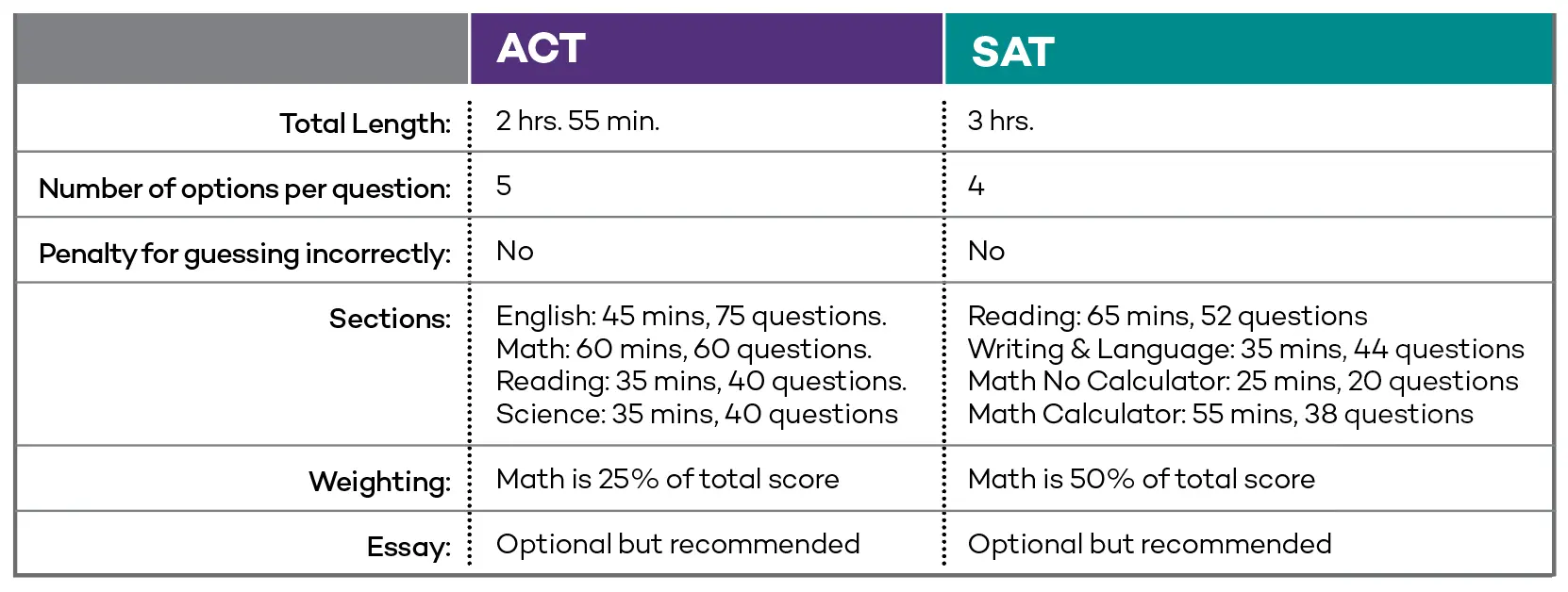

Which Test Should They Take? ACT or SAT?
The most important thing to know is that every school in the United States accepts either SAT or ACT scores, so it comes down to which format your child prefers—and which one they do better on. However, they often won’t know until they have taken both, which is why it might be wise to sit for each of them early in the process, such as fall of junior year.
“Since you are not obligated to submit your scores unless you choose to, taking both tests is a good opportunity to figure out where your child shines,” says Emily Levitt, vice president of education at Sylvan Learning.
After they’ve taken both, you can use the scores as a baseline to determine which may be a better fit, says Kristina Dooley, a Certified Educational Planner (CEP) and founder and president of Estrela Consulting in Hudson, Ohio. “If there is a clear gap between scores on the two initial tests, we encourage the student to move ahead with the one on which they scored higher.” If the scores are fairly similar, have your teenager choose the format they prefer.
What Are the ACT and SAT Test Differences?
While the exams essentially cover the same skills, there are some key differences. For example, the ACT has a dedicated science section, while the SAT weaves science into some of its other questions. The ACT is more of a sprint, offering less time for each question, and has five options per question, while the SAT has four, giving students slightly better odds in guessing on the SAT. And the SAT has two math sections, one of which requires students to complete it without a calculator. The chart below can help you compare and contrast the two test formats.
| [adrotate banner=”130″] |
How Often Should They Take the Test?
Most students will want to take the test two to three times. The first time should be considered a practice. Students should take it again after some concerted study. Consider taking it a third time if they are convinced that more prep can improve their score enough to hit a specific scholarship target or improve their chance of admission at a particular school.
“Students will experience something called the ‘practice effect,’ which is the theory that after you’ve taken a test once, you will likely see your score rise because you know what you’re walking into,” Levitt says. “The format, the breaks, everything will feel more familiar to the student, thus making them feel more comfortable taking the test the second time.” So your child will want to take the exam at least twice, to enjoy the small bump just from that practice effect, she says.
Dooley says that studies have shown that students tend to max out their scores by the third time. “Unless they plan to pursue a rigorous test prep program after that third sitting, we don’t necessarily encourage them to continue testing,” she says.
To Essay or Not to Essay?
Levitt recommends sitting for the essay portion at least once. “It’s optional, but since most kids opt out, it really shows you’re putting in the extra effort to write it,” Levitt says. She finds that most students tend to answer the prompt as though it were a dry academic paper, but the best way to make their piece stand out is to let their own voice shine through. “You want to it to be enjoyable to read,” she points out. The good news is that if you score sufficiently on the first essay, you don’t have to redo it each time because you can carry over the essay score when you retake the other sections.
Helping Them Prepare
Before you start any test prep, talk to your child about their concerns, Levitt recommends.
Sometimes it’s content-based, which means they should seek out extra practice from a prep book or workshop to boost specific skills. But other times they need test-taking strategies because they are not sure how to decipher different types of questions or aren’t sure if skipped questions count against them.
Levitt recommends starting prep eight-to-10 weeks out and definitely no less than six weeks. “You want to chip away at it versus cram like crazy.”
Dooley also suggests lots of practice tests. Students should spend time completing timed practice tests or individual test sections. “Most students are not used to taking timed standardized tests so the pacing can be tricky,” she says. “Just as student athletes and musicians practice to improve, the same is true with test-taking.”
Finally, get a good night’s sleep before the test, eat a good breakfast, and take a deep breath. “Remember, you can always take it again,” Levitt says. “Give it your best shot, but don’t fret that your whole future is riding on this. School admissions departments look at the whole student, not just test scores.”

Remind your student that their grades, the courses they took, AP or IB exam scores, essay, recommendations, and extra-curricular activities will all factor into the selection process. Says Levitt, “Any combination of these factors can make you stand out from the crowd.”





